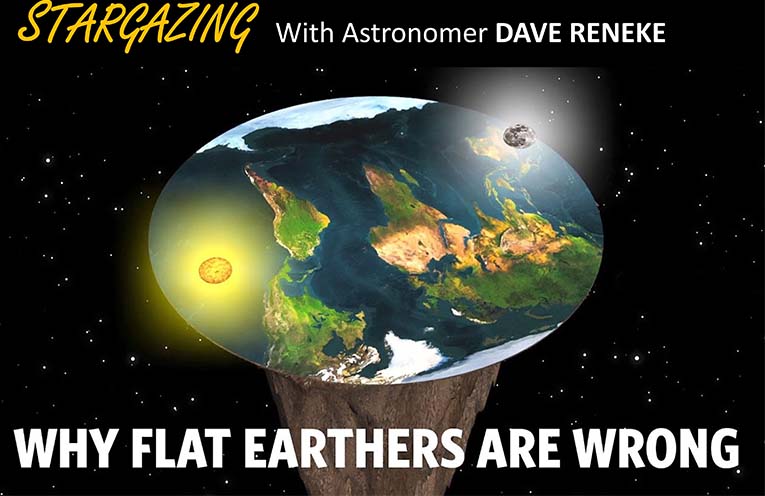Stargazing: Flat Earth Fantasia

IN the grand parade of human beliefs, there’s a particularly quirky float where logic and common sense seem to have taken a permanent vacation.
Welcome to the wacky world of Flat Earthers – a group of folks who believe our planet is as flat as a pancake, despite all evidence saying otherwise.
So, how did this bizarre idea come about?
Well, a long time ago, before we had fancy gadgets and space travel, ancient people didn’t really know the Earth was round.
Early civilizations based their understanding of the world on immediate, observable evidence.
To them, the Earth seemed flat because the horizon appeared level.
Ancient Greeks speculated that the Earth was surrounded by a vast, encircling ocean. The edge was often imagined as a perilous boundary beyond which there were monsters or unknown lands.
But in the 19th century, a chap named Samuel Rowbotham decided this was true, a flat Earth was the way to go, and voila, the Flat Earth Society was born.
Fast forward to today, and this group is still around, clinging to their belief with the same determination as a toddler holding onto their favourite toy.
They’ve managed to dodge centuries of scientific proof – thanks to astronomy, physics, and those awesome space missions – like it’s no big deal.
Who joins the Flat Earth Society?
Honestly, it’s a mixed bag.
You’ve got people from all walks of life who just can’t seem to accept the Earth isn’t flat. While some might just laugh it off as harmless quirkiness, others worry that denying such obvious facts can be dangerous, especially when fake news spreads faster than a viral cat video.
The internet, oh the internet, has been a game-changer for this group.
It’s like a giant megaphone for people who want to shout, “The Earth is flat!”
Social media, YouTube, and online forums are like their playgrounds where they gather to share their wacky ideas and try to convince others that the Earth isn’t round, even though everyone else has long agreed that it is.
Australia, known for its beautiful beaches and kangaroos, isn’t immune to this flat Earth fever.
Despite its rich history in science and space exploration, there’s a small but noisy group of Flat Earthers here.
They hold quirky “conferences” that are basically like a cosplay event for people who think the Earth is a disc.
Most Flat Earthers hang out online.
They have websites, forums, and social media accounts where they discuss their flat Earth theories and try to convince others to join their ranks.
Sometimes they even have in-person meetings with guest speakers who talk about, you guessed it, why they think the Earth is flat.
In the world of serious science, the flat Earth theory is about as useful as a chocolate teapot.
It’s a throwback to a time when people didn’t know much about the world around them. While the rest of us are marvelling at space rockets and scientific breakthroughs, Flat Earthers are busy arguing that the Earth is a giant, invisible frisbee.
So, how should we deal with this?
While it might be tempting to laugh and shake our heads, maybe a better approach is to focus on teaching and encouraging critical thinking.
After all, understanding science is way cooler than believing in a flat Earth.
By Dave RENEKE


